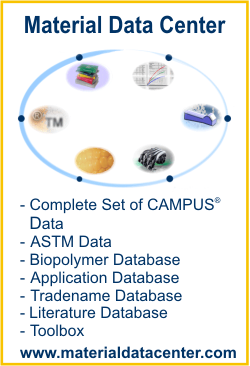Material Data Center is a leading international information system for the plastics industry. Material Data Center offers a comprehensive plastics database, calculation tools, CAE interfaces, a literature database and an application database. For more information about Material Data Center visit www.materialdatacenter.com.
This is the free Material Data Center Datasheet of Orgalloy® RS 6000 NAT - PA6... - ARKEMA
unit conversion, PDF datasheet print, comparison with other plastics, snap fit calculation, beam deflection calculation, parameters for material models, CAE Interfaces
Check here, which other Orgalloy R datasheets, application examples or technical articles are available in Material Data Center
Main applications:
- Automotive tube clamping
- Ablation plate for miniature circuit breaker
- Electric connectors
- Sport parts
Packaging:
This grade is delivered dried in sealed packaging (25kg bags) ready to be processed.
Shelf life:
Two years from the date of delivery. For any use above this limit, please refer to our technical services.
| Caracteristicas de procesamiento y fisicas | Seco / Cond | Unidades | Método de ensayo | ||||||||||||||||||||||||||||||||||||||||||||||||||||||||||||||||||||||||||||||||||||||||||||||||
| ISO Data | |||||||||||||||||||||||||||||||||||||||||||||||||||||||||||||||||||||||||||||||||||||||||||||||||||
| Indice de fluidez volumétrico, MVR | 8 / * | cm³/10min | ISO 1133 | ||||||||||||||||||||||||||||||||||||||||||||||||||||||||||||||||||||||||||||||||||||||||||||||||
| Temperatura | 235 / * | °C | - | ||||||||||||||||||||||||||||||||||||||||||||||||||||||||||||||||||||||||||||||||||||||||||||||||
| Carga | 2.16 / * | kg | - | ||||||||||||||||||||||||||||||||||||||||||||||||||||||||||||||||||||||||||||||||||||||||||||||||
| Propiedades mecánicas | Seco / Cond | Unidades | Método de ensayo | ||||||||||||||||||||||||||||||||||||||||||||||||||||||||||||||||||||||||||||||||||||||||||||||||
| ISO Data | |||||||||||||||||||||||||||||||||||||||||||||||||||||||||||||||||||||||||||||||||||||||||||||||||||
| Módulo de tracción | 2280 / 2030 | MPa | ISO 527 | ||||||||||||||||||||||||||||||||||||||||||||||||||||||||||||||||||||||||||||||||||||||||||||||||
| Esfuerzo de fluencia | 55 / 47 | MPa | ISO 527 | ||||||||||||||||||||||||||||||||||||||||||||||||||||||||||||||||||||||||||||||||||||||||||||||||
| Alarg. en límite elástico | 4 / 6 | % | ISO 527 | ||||||||||||||||||||||||||||||||||||||||||||||||||||||||||||||||||||||||||||||||||||||||||||||||
| Alarg. nominal a rotura | >50 / >50 | % | ISO 527 | ||||||||||||||||||||||||||||||||||||||||||||||||||||||||||||||||||||||||||||||||||||||||||||||||
| Módulo de plastodeformación, 1h | * / 2030 | MPa | ISO 899-1 | ||||||||||||||||||||||||||||||||||||||||||||||||||||||||||||||||||||||||||||||||||||||||||||||||
| Módulo de plastodeformación, 1000h | * / 870 | MPa | ISO 899-1 | ||||||||||||||||||||||||||||||||||||||||||||||||||||||||||||||||||||||||||||||||||||||||||||||||
| Resistencia al impacto Charpy, +23°C | 61 / 67 | kJ/m² | ISO 179/1eU | ||||||||||||||||||||||||||||||||||||||||||||||||||||||||||||||||||||||||||||||||||||||||||||||||
| Resistencia al impacto Charpy, -30°C | 59 / 59 | kJ/m² | ISO 179/1eU | ||||||||||||||||||||||||||||||||||||||||||||||||||||||||||||||||||||||||||||||||||||||||||||||||
| Resistencia al impacto Charpy c/entalla, +23°C | 7 / 8 | kJ/m² | ISO 179/1eA | ||||||||||||||||||||||||||||||||||||||||||||||||||||||||||||||||||||||||||||||||||||||||||||||||
| Resistencia al impacto Charpy c/entalla, -30°C | 5 / 5 | kJ/m² | ISO 179/1eA | ||||||||||||||||||||||||||||||||||||||||||||||||||||||||||||||||||||||||||||||||||||||||||||||||
| Dureza Shore D | 73 / * | - | ISO 7619-1 | ||||||||||||||||||||||||||||||||||||||||||||||||||||||||||||||||||||||||||||||||||||||||||||||||
| Propiedades térmicas | Seco / Cond | Unidades | Método de ensayo | ||||||||||||||||||||||||||||||||||||||||||||||||||||||||||||||||||||||||||||||||||||||||||||||||
| ISO Data | |||||||||||||||||||||||||||||||||||||||||||||||||||||||||||||||||||||||||||||||||||||||||||||||||||
| Temperatura de fusión, 10°C/min | 220 / * | °C | ISO 11357-1/-3 | ||||||||||||||||||||||||||||||||||||||||||||||||||||||||||||||||||||||||||||||||||||||||||||||||
| Estabilidad al calor, 1.80 MPa | 71 / * | °C | ISO 75-1/-2 | ||||||||||||||||||||||||||||||||||||||||||||||||||||||||||||||||||||||||||||||||||||||||||||||||
| Estabilidad al calor, 0.45 MPa | 130 / * | °C | ISO 75-1/-2 | ||||||||||||||||||||||||||||||||||||||||||||||||||||||||||||||||||||||||||||||||||||||||||||||||
| Temp. reblandecimiento Vicat, B | 150 / * | °C | ISO 306 | ||||||||||||||||||||||||||||||||||||||||||||||||||||||||||||||||||||||||||||||||||||||||||||||||
| Coef.de expansión térmica lineal, paralelo | 93 / * | E-6/K | ISO 11359-1/-2 | ||||||||||||||||||||||||||||||||||||||||||||||||||||||||||||||||||||||||||||||||||||||||||||||||
| Coef.de expansión térmica lineal, normal | 133 / * | E-6/K | ISO 11359-1/-2 | ||||||||||||||||||||||||||||||||||||||||||||||||||||||||||||||||||||||||||||||||||||||||||||||||
| Combustibilidad a 1.5mm esp. nom. | HB / * | class | IEC 60695-11-10 | ||||||||||||||||||||||||||||||||||||||||||||||||||||||||||||||||||||||||||||||||||||||||||||||||
| Espesores de probeta | 1.6 / * | mm | - | ||||||||||||||||||||||||||||||||||||||||||||||||||||||||||||||||||||||||||||||||||||||||||||||||
| Combustibilidad a espesor h | HB / * | class | IEC 60695-11-10 | ||||||||||||||||||||||||||||||||||||||||||||||||||||||||||||||||||||||||||||||||||||||||||||||||
| Espesores de probeta | 3.2 / * | mm | - | ||||||||||||||||||||||||||||||||||||||||||||||||||||||||||||||||||||||||||||||||||||||||||||||||
| Propiedades eléctricas | Seco / Cond | Unidades | Método de ensayo | ||||||||||||||||||||||||||||||||||||||||||||||||||||||||||||||||||||||||||||||||||||||||||||||||
| ISO Data | |||||||||||||||||||||||||||||||||||||||||||||||||||||||||||||||||||||||||||||||||||||||||||||||||||
| Constante dieléctrica, 100Hz | - / 3 | - | IEC 62631-2-1 | ||||||||||||||||||||||||||||||||||||||||||||||||||||||||||||||||||||||||||||||||||||||||||||||||
| Constante dieléctrica, 1MHz | - / 3 | - | IEC 62631-2-1 | ||||||||||||||||||||||||||||||||||||||||||||||||||||||||||||||||||||||||||||||||||||||||||||||||
| Factor de pérdidas dieléctricas, 100Hz | - / 620 | E-4 | IEC 62631-2-1 | ||||||||||||||||||||||||||||||||||||||||||||||||||||||||||||||||||||||||||||||||||||||||||||||||
| Factor de pérdidas dieléctricas, 1MHz | - / 250 | E-4 | IEC 62631-2-1 | ||||||||||||||||||||||||||||||||||||||||||||||||||||||||||||||||||||||||||||||||||||||||||||||||
| Resistividad volumétrica específica | - / >1E13 | Ohm*m | IEC 62631-3-1 | ||||||||||||||||||||||||||||||||||||||||||||||||||||||||||||||||||||||||||||||||||||||||||||||||
| Resistividad superficial específica | * / >1E15 | Ohm | IEC 62631-3-2 | ||||||||||||||||||||||||||||||||||||||||||||||||||||||||||||||||||||||||||||||||||||||||||||||||
| Resistencia dieléctrica | 38 / 38 | kV/mm | IEC 60243-1 | ||||||||||||||||||||||||||||||||||||||||||||||||||||||||||||||||||||||||||||||||||||||||||||||||
| Indice comparativo de linea de fuga | * / 600 | - | IEC 60112 | ||||||||||||||||||||||||||||||||||||||||||||||||||||||||||||||||||||||||||||||||||||||||||||||||
| Otras propiedades | Seco / Cond | Unidades | Método de ensayo |
| Absorción de agua | 6.6 / * | % | Sim. to ISO 62 |
| Absorción de humedad | 2.2 / * | % | Sim. to ISO 62 |
| Densidad | 1030 / 1030 | kg/m³ | ISO 1183 |
| Recomendación para procesamiento Moldeo por inyección | Valor | Unidades | Método de ensayo |
| Temperatura de pre-secado | 80 | °C | - |
| Tiempo de pre-secado | 4 - 8 | h | - |
| Temperatura de la masa | 260 - 280 | °C | - |
| Temperatura del molde | 20 - 60 | °C | - |
- Drying time (only necessary for bags opened for more than two hours): 4-8 hours at 80°C
- Injection temperature (min-recommended-max): 260-270-280°C
- Mould temperature (min-max): 20-60°C
Material Data Center is provided by M-Base Engineering + Software GmbH. M-Base Engineering + Software GmbH assumes no liability for the system to be free of errors. Any decision about the application of materials must be double checked with the producer of this material.
Additional information about this material, like producer contact address, etc. can be found at www.materialdatacenter.com. For access to this extra information a registration is requested. Free online registration is available.














